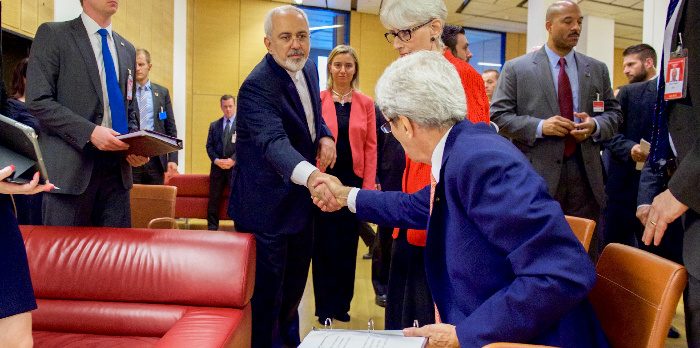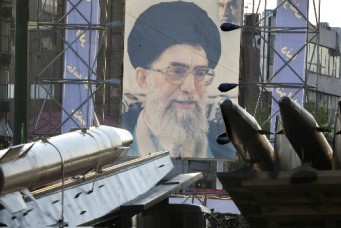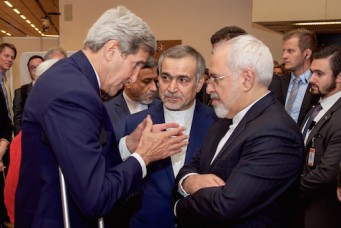Donald Trump’s Art of the Iran Deal
The U.S. Republican presidential candidate is outspokenly hostile towards the 2015 Iran nuclear deal. Yet his erratic promises to renegotiate, or cancel, the deal reveal an ignorance of diplomacy.

Iranian Foreign Minister Javid Zarif shakes hands with U.S. Secretary of State John Kerry, Vienna, July 14, 2015. U.S. Department of State
If Donald Trump becomes president of the United States, the Iran deal will have had something to do with it. According to his son Eric Trump, the Barack Obama administration’s agreement with Tehran, the Joint Comprehensive Plan of Action (JCPOA), was one of the main factors in his father’s decision to run for the Republican nomination. As seen by Trump, Obama’s diplomats failed to learn the negotiating skills that the Republican nominee outlined in his 1987 best-selling book, Trump: The Art of the Deal.
Despite his campaign bluster on the Islamic Republic of Iran, Trump was actually an early advocate of talking to Tehran. In December 2011, he told CNN’s Wolf Blitzer, “Look, nobody’s even talking to Iran. Now, maybe they’re the evil empire, maybe they’re the bad people, and maybe they’re not, you know, got to talk. Nobody talks.”
Trump said he was even willing to deal with Mahmoud Ahmadinejad, the hardline president of Iran at the time, who Trump said may have “good reason” to hate the United States. In the CNN interview, Trump feared that Obama, lacking deal-making skills, might end up starting a war with Iran thinking it was a way to get re-elected to a second term.
Most of Donald Trump’s pro-deal sentiment can be found on his Twitter feed. In one tweet, he said that a nuclear deal was possible because Tehran knew Washington could “blow them away to the Stone Age.” Between 2012 and 2015, Trump continuously advised Obama on social media to be “cool,” “calm,” and “move slowly” when negotiating a deal with Iran.
When the P5+1 diplomatic group—including the United States, Britain, China, France, Russia, and Germany—signed an interim nuclear agreement with Iran in November 2013, Trump blasted it as “rotten,” “imbecilic,” and a “bad deal.” Trump had the same opinion of the final agreement, reached in 2015. With a view to preventing Iran from building a bomb, the nuclear deal restricts Iran’s uranium enrichment and prevents weapons-grade plutonium production; it requires Iran to cooperate with inspections by the International Atomic Energy Agency. In exchange, Iran received economic benefits such as relief from banking and nuclear-related sanctions.
Trump seized on the nuclear negotiations when he announced his presidential candidacy in June 2015. “I will stop Iran from getting nuclear weapons,” he said in his Trump Tower speech. “And we won’t be using a man like Secretary [John] Kerry that has absolutely no concept of negotiation, who’s making a horrible and laughable deal, who’s just being tapped along as they make weapons right now.”
In August 2015, he told NBC’s Meet the Press, the Iran deal would “lead to nuclear holocaust.” During his acceptance speech at the Republican Convention a year later, he described Obama’s Iran deal as the worst in U.S. history and argued that Tehran was well on its way to obtaining nuclear weapons.
So what is Donald Trump’s art of the Iran deal? Trump believes that Obama’s negotiating strategy should have included tightening sanctions on Iran, banning Iran’s trade with North Korea, insisting on the release of Americans imprisoned in Iran, refusing to unfreeze $150 billion in Iranian assets held in the United States since the U.S. embassy hostage crisis in 1979, and generally playing hard to get.
Trump told CNN in July 2015, “We should double up and triple up the sanctions and have them come to us.” Later to the New York Times he said, “We should have doubled up the sanctions and made a much better deal.” In his latest book, Crippled America: How to Make America Great Again, Trump wrote that he had no faith in the sanctions “snapback” clause—one of the mechanisms in the JCPOA to ensure Iran’s continued compliance with its obligations in the nuclear accord.
Nonetheless, during his presidential campaign Trump continued flip-flopping on the idea of making some kind of deal with Iran. “It’s very hard to say, ‘We’re ripping it up,’” he explained. Trump elaborated on MSNBC’s Morning Joe in September 2015: “I love to buy bad contracts where … people go bust, and I make those contracts good. This is a perfect example of taking over a bad contract. I will find something in that contract that will be very, very well-scrutinized by us, and I think they will not be able to do it, whatever it may be.”
At the annual American Israel Public Affairs Committee convention in March, Trump proclaimed, “My number-one priority is to dismantle the disastrous deal with Iran.” Then Trump told the New York Times: “It would have been so much better if they had walked away a few times.”
During a rally in April, Trump made odd statements that seemed to imply acceptance of normalizing relations with Iran, with a Trump twist. He proposed selling $12 billion in weapons to Tehran—but faulty ones, in the hope that Iran would sue the United States so he could then respond, “Oh, I’m sorry they don’t work. Gee, that’s too bad.” Trump complained to the Washington Post editorial board that Iranians were going “out of their way not to spend any money in our country.” A case in point was Boeing airplanes, Trump explained, even though Boeing in fact is finalizing a deal to sell some eighty planes to Iran.
Whether any of Trump’s complaints have merit or not, he seems oblivious to the fact that dismantling the Iran deal would have serious repercussions—for America’s standing with international allies who partnered in the deal, and for the prospects of Iranian moderates seeking to normalize Iran’s relations with the world. The Obama administration’s decision to negotiate was partly driven by a concern that Iran’s hardliners would persist with clandestine means to potentially develop nuclear weapons if Tehran was not given incentives to accept international monitoring; and that failing to prevent Iran’s nuclear weapons capability through peaceful negotiations could lead to a new Middle East conflict with Israel and the United States on the forefront.
“The candidates for the American presidency have competed to vilify Iran in their speeches, and this is a sign of hostility,” said Supreme Leader Ayatollah Ali Khamenei in his Nowruz speech last March. Hossein Shariatmadari, editor-in-chief of the conservative Kayhan newspaper, gave Trump a backhanded endorsement: “The wisest plan of crazy Trump is tearing up the nuclear deal.”
Tearing up the Iran deal would give ammunition to hardliners to humiliate Iran’s pragmatic president, Hassan Rouhani, who oversaw the negotiations with the P5+1. It would be confirmation of the hardliners’ article of faith: Washington cannot be trusted. If the art of the deal fails, and Iran’s nuclear program proceeds without international monitoring, the world may have to contend with Trump’s art of the war.
Holly Dagres is the curator of the weekly newsletter The Iranist and a contributing editor at the Cairo Review of Global Affairs. She has contributed to Aeon, Al Jazeera, Al-Monitor, Huffington Post, Foreign Policy and others. On Twitter: @hdagres.




